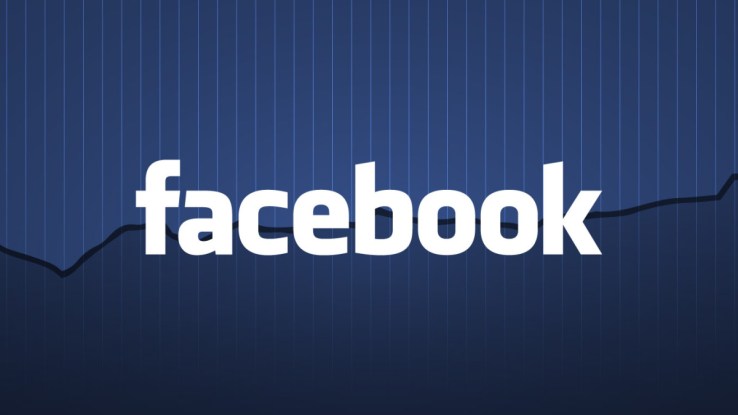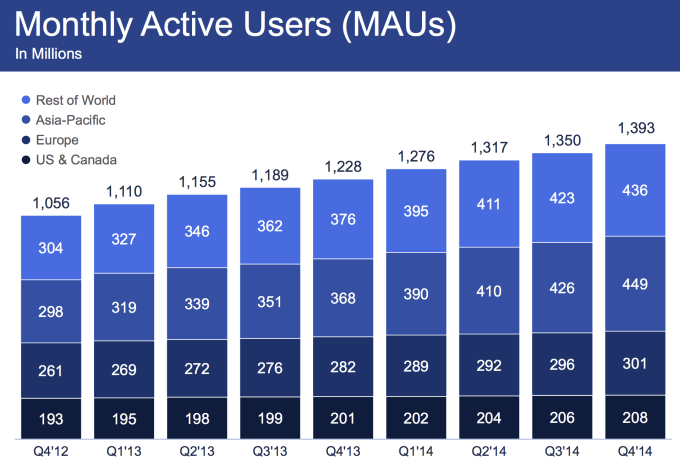 Facebook beat the street’s estimates for the 10th straight quarter in Q4 2014.
It now has 1.393 billion users, up 3.18% quarter over quarter, which
was a little faster than Q3’s 2.2% but slower than Q2’s 3.125%. The
company brought in $0.54 EPS on $3.85 billion in revenue. Mobile made up
69% of ad revenue compared to 66% last quarter, showing its business is
now firmly mobile.
Facebook beat the street’s estimates for the 10th straight quarter in Q4 2014.
It now has 1.393 billion users, up 3.18% quarter over quarter, which
was a little faster than Q3’s 2.2% but slower than Q2’s 3.125%. The
company brought in $0.54 EPS on $3.85 billion in revenue. Mobile made up
69% of ad revenue compared to 66% last quarter, showing its business is
now firmly mobile.
Facebook now has 890 million daily users, 1.19 billion mobile monthly users (up 6.2%), and 745 million daily mobile users (up 5.97%). That means Facebook’s mobile growth rate is actually increasing. Mobile-only users soared to 526 million, up 15.3% QOQ thanks to Facebook’s expanding growth efforts in the developing world where desktop computers are rare.

Wall Street expected $3.78 billion in revenue and $0.48.
Other Facebook financial results include $2.72 billion in GAAP costs and
expenses, $1.13 billion in GAAP income, a 29% GAAP operating margin,
and $517 million in capital expenditures. Its costs have risen
significantly as it warned investors, but its investments in Oculus and
artificial intelligence could pay off big time in a few years.
As for 2014 as a whole, Facebook hit $12.47 billion, an
increase of 58% year-over-year, with daily users up 18% from 757 million
and total users up 13% from 1.23 billion at the end of 2013.
Facebook spent Q4 focusing on improving its News Feed
quality so more users would spend more time where it shows ads. It also
got serious about serving video content, leading to huge increases in
video views. It now sees 3 billion video views per day. By boosting organic video viewership, Facebook will be able to slide more lucrative video ads into the feed.
Facebook recently revealed its pilot for an enterprise
social network product called Facebook At Work, but it’s not earning any
revenue on it yet.
One remarkable number here is how Facebook’s advertising and measurement tools are letting is earn much more money from the same number of users.
Facebook’s user count in the US & Canada only grew by 0.97% from
204 million to 206 million, but the average ad revenue it earns from
each of those users grew 24% from $6.64 to $8.26.

On the earnings call, CEO Mark Zuckerberg mentioned that
over time, content on Facebook has evolved to be more rich — aka from
text to photos to videos. He said that Facebook is working on tools that
aid in rich content creation.
I’d expect Facebook to release either a standalone video
storytelling app, or significantly improve the video and rich media
sharing tool in its main app. That’s something I’ve been saying Facebook should do since 2013.
Right now, Facebook’s app doesn’t let you edit videos,
tap-and-hold-to-capture, shoot multiple shots in a single video, set a
cover frame, stabilize the image, or jazz up your creation with
drawings, stickers, or audio. Any of those features would be welcomed
improvements.
Overall, the takeaway from this quarter’s earnings is that
Facebook is not only just a mobile-first company. It’s becoming a
mobile-only company. Over a half billion people now use the social
network only from phone. Many of those are feature phone users, though.
Facebook’s next big challenge will be figuring out how to squeeze more
revenue out of people with less buying power. That could make its
efforts to connect the rest of the world a very profitable mission.